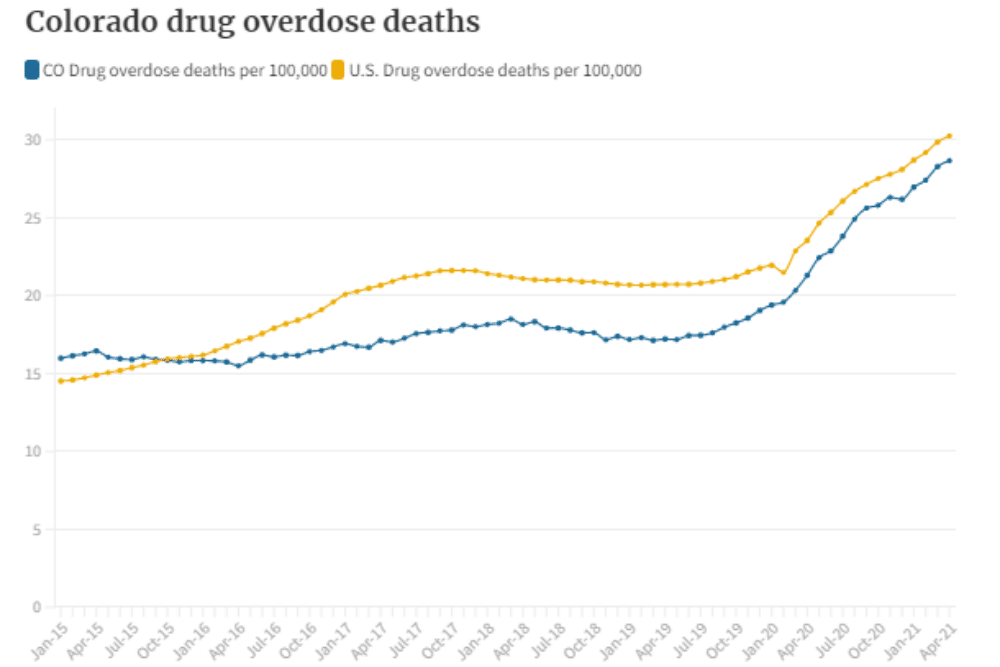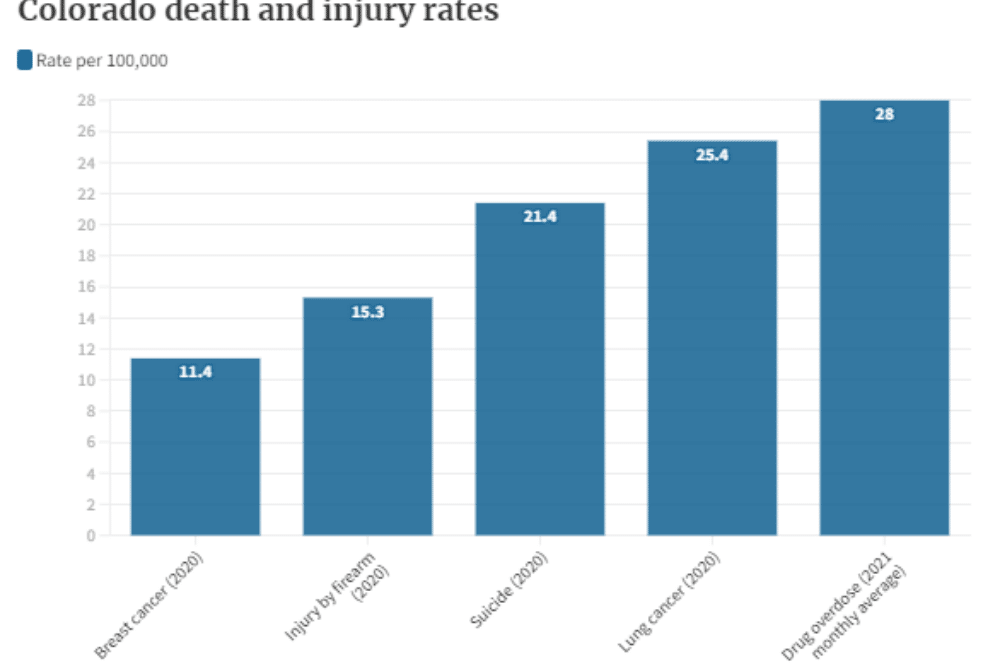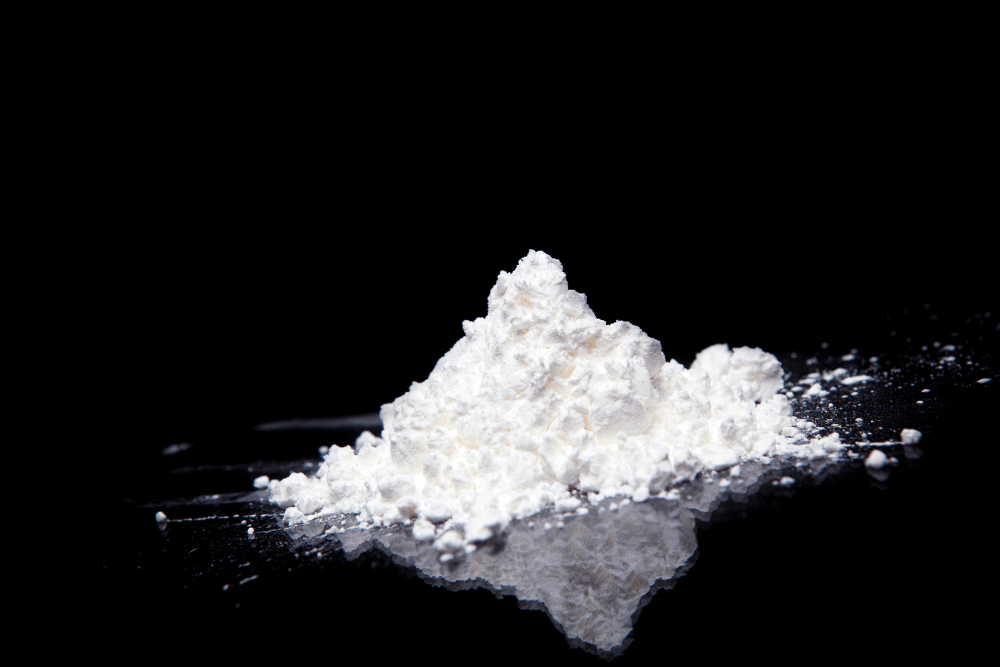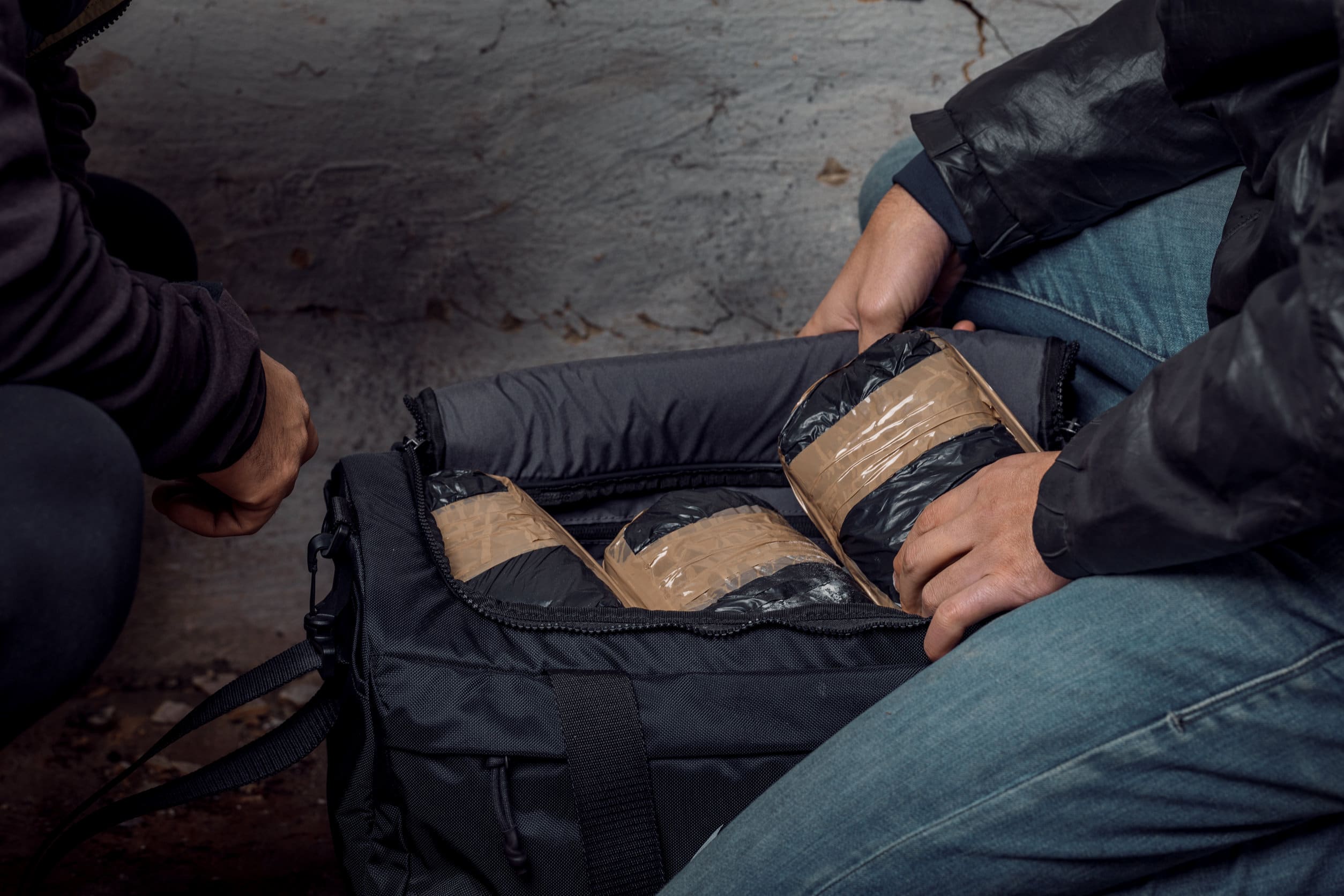While the state of Colorado has gotten a lot of attention for its decriminalization of some drugs, that doesn’t mean that anything goes in our state. It is still a crime to manufacture, sell, possess, and use controlled substances.
However, the law in Colorado surrounding drug crimes has become complex. That’s why it’s imperative to have an experienced attorney on your side if you find yourself facing drug charges.
Below you will find an overview of the laws regarding drugs in Colorado, the drug crimes a person can still be charged with, and what the penalties conviction of these crimes can bring.
First, though, we’ll provide some context to these crimes and the problem with drugs that our state is facing.
Colorado Drug Stats and Facts
Drug laws are not created in a vacuum. While we can debate the reasons behind the laws, the groups that seem to be unfairly targeted by them, and whether or not the laws actually work – the fact is that our state has a serious problem.
According to the U.S. Centers for Disease Control and Prevention, overdose deaths reached an all-time high between April 2020 and April 2021 – 1,655 deaths per 100,000 people.

Source: U.S. Centers for Disease Control and Prevention
To put this into an even clearer perspective, overdose injuries and deaths grew to eclipse a number of other serious health problems, including breast cancer, firearm injuries, suicide, and lung cancer.

Source: Colorado Department of Public Health and Environment
Because of these eye-opening statistics – and others – our state takes criminal drug activity very seriously, so it is important that you understand the consequences if you find yourself facing a charge.
Drug Crimes in Colorado: The Basics
There are three major drug offenses that a person can be charged within Colorado. They include:
Drug Use
In most cases, drug use is a misdemeanor crime in the state, but there are exceptions to this. If someone takes a drug without a valid prescription or not as prescribed, that can be a more serious charge.
Drug Possession
With the exception of certain amounts of marijuana for those over 21, it is prohibited to possess controlled substances in Colorado. Drug possession charges fall into one of these three categories in most cases:
- Actual possession, which is having drugs physically on a person
- Joint possession, which is sharing control or ownership with another of a controlled substance
- Constructive possession, which is having control over a controlled substance
Which level of drug crime a person is charged with regarding possession depends on the type of drug in their possession as well as the amount.
Selling or Manufacturing Drugs
With the exception of certain amounts of marijuana for those over 21, it is prohibited to possess controlled substances in Colorado. Drug possession charges fall into one of these three categories in most cases:
- Actual possession, which is having drugs physically on a person
- Joint possession, which is sharing control or ownership with another of a controlled substance
- Constructive possession, which is having control over a controlled substance
Which level of drug crime a person is charged with regarding possession depends on the type of drug in their possession as well as the amount.

This can be a misdemeanor or a felony. It really depends on the type of drugs involved in the case, the criminal history of those involved, and how much a person is accused of selling or manufacturing.
Those are the very general charges a person can face. Continue reading for more detail about the different levels of drug crimes.
Drugs in Colorado: Are Any Legal?
In Colorado, a person over the age of 21 can legally possess marijuana in limited quantities. If anyone is found with more than one ounce of marijuana in the state, or they are underage with any amount, then they can face drug charges.
Additionally, even though some amounts of marijuana are legal at the state level, it is still illegal to possess it on federal property within Colorado, because of the federal Controlled Substances Act. Federal property that prohibits any amount of marijuana possession includes post offices, National Parks, the VA, airports, HUD housing, and courthouses.
Illegal Drugs in Colorado
The state has laws that outline different controlled substances and rank them in severity. Those ranks are referred to as “schedules”, and Colorado has five drug schedules it uses to dole out convictions. These schedules reflect the potential the substance has for abuse/addiction, and it factors in legitimate medical usages.
The five drug schedules in Colorado are:
Schedule I
These are the drugs assessed to be the highest risk for abuse and dependency. They are also judged to have no accepted medical value. This schedule includes substances such as hallucinogens, heroin, peyote, and mescaline.
Schedule II
The drugs on this schedule still carry a high risk for abuse and dependency but do have some limited accepted medical value. The drugs on this schedule include substances such as hydrocodone, opium, fentanyl, methamphetamines, and cocaine.

Schedule III
The drugs on this schedule exhibit less of a risk for abuse and dependency, and they have accepted medical uses. You can find barbiturates, anabolic steroids, ketamine, and medications with codeine on this schedule.
Schedule IV
The drugs on this schedule have a lower risk of dependency and abuse, plus accepted medical uses. The substances on this schedule include sleep medications like Ambien and anti-anxiety medications, such as Valium.
Schedule V
The substances on this schedule are judged to be the least likely to cause dependency or abuse, with accepted medical uses. Drugs on this schedule include medications with small amounts of narcotics, such as cold medications and cough syrup.
Penalties for Drug Crimes
In Colorado, the authorities want to encourage those facing drug charges to get help for potential issues with addiction or abuse. That’s why they often will favor drug treatment over incarceration for charges that stem from drug possession in amounts that appear to be for personal use.
There are several alternatives in the state for imprisonment in drug crimes cases. These include specialized drug courts and deferred sentencing, as well as Veterans Treatment Courts.

Due to this mindset, the state views drug crimes like drug possession and drug use as misdemeanors in most situations, but drug possession can still be a felony charge. If a person is caught with four grams or more of a controlled substance from schedule I or schedule II, or they are found in possession of any amount of GHB, it can be a felony.
Additionally, drug crimes – such as the sale or manufacturing of drugs – are also felony charges in most circumstances. The penalties for drug crimes in Colorado depend on a few factors like the schedule of the drug involved in the case, the amount of drugs involved, the nature of the drug use (personal or sale), if a person has a history of drug crimes on their criminal record, and whether or not a person is on probation or parole for another felony crime.
In general, drug crimes can send a person to prison for as little as 180 days or as much as 32 years. It depends on the level of drug crime a person is facing.
The Seven Classes of Drug Crimes
Drug crimes in Colorado are divided into seven separate classes for felonies and misdemeanors. They are:
Level I Drug Felony
This is the most serious level of a drug felony in Colorado. It is often charged in cases where a person is accused of selling over 225 grams of a controlled substance from Schedule I or Schedule II, or if they are accused of selling 112 grams or more of heroin, cathinone, ketamine, or methamphetamine.
Additionally, selling a controlled substance from Schedule I or II to a minor will result in this charge – as well as selling marijuana to a minor or selling more than 50 pounds of marijuana to anyone.
The penalties for Level I drug felonies include up to 32 years in prison and up to $1 million in fines. If aggravating factors, like being on parole when the crime was committed, are a part of the case, there is a minimum sentence of 12 years in prison.

Level II Drug Felony
The second most serious level of drug felony, Level II drug felonies can send a person to prison for up to eight years and make them responsible for fines of as much as $750,000. If aggravating factors are present, then a person can serve up to 16 years behind bars for the crime.
Crimes on this level include:
- Selling between 14 and 225 grams of a substance from Schedule I or II
- The unlawful possession of material to make amphetamine or methamphetamine
- The unlawful distribution or sale of materials used to manufacture controlled substances
Level III Drug Felony
Level III drug felonies are often charged in these cases:
- There is an attempt to commit a level II drug felony
- The sale of up to 14 grams of a drug from Schedule I or II
- The distribution of an imitation controlled substance to a minor
The penalties for this level of drug offense include up to four years behind bars and as much as $500,000 to be paid in fines. If aggravating factors are present in the case, then the prison sentence can increase up to six years.
Level IV Drug Felony
The types of crimes that can land someone with a Level IV drug charge include:
- The attempt of a level III drug felony
- The selling of up to four grams of a controlled substance from schedule III or IV
- The possession of GHB, ketamine, flunitrazepam, or four grams or more of a drug from schedule I or II
If found guilty, a person can face up to 12 months in prison and be responsible for fines of as much as $100,000. If aggravating factors are present, then the penalty doubles to two years in prison.
Level I Drug Misdemeanor
The types of crimes that can result in this level of charge comprise:
- The possession of more than six ounces of marijuana
- The unlawful possession of a substance from schedule III or IV, or up to four grams of a schedule I or II substance
- Attempt of a level IV drug felony
The penalties for this level of drug crime in the state include up to 18 months in jail and payment of fines of up to $5,000.

Level II Drug Misdemeanor
The types of crimes that can result in this level of drug crime include abusing toxic vapors, advertising of drug paraphernalia, the possession of more than two ounces of marijuana, the attempt of a level I or II drug misdemeanor, and the unlawful use of a controlled substance.
If found guilty, a person can face up to one year in jail and fines of as much as $750.
Petty Drug Offenses
The lowest level of drug crimes in the state, petty drug offenses include actions like:
- Possession of up to two ounces of marijuana
- The possession of drug paraphernalia
- Possession of prescribed medication in a container it was not dispensed in
The most serious penalties faced for this level include a fine of $100.
Defending Against Drug Crimes in Colorado
Everyone is entitled to a robust defense under the law. Remember – every single person is innocent until proven guilty. When you work with an experienced attorney, they can listen to the details of your case and help advise on the best defense.
In general, solid defense strategies in drug crime cases often involve one or more of these defenses:
Unlawful Search
In the United States Constitution, every person is protected against what is called “illegal search and seizure.” Basically, this means that certain circumstances must exist in order for a law enforcement officer to search a person’s property or body.
An officer must have probable cause in order to search a person or their property. Probable cause, for instance, could be justified if drugs are in plain view of the officer. Basically, they need to have reasonable suspicion that a person has committed a crime before they search.
If it can be shown in court that there was no probable cause, then any evidence gathered against someone during that illegal search can be thrown out of court and not used against them.

The Drugs Were Not Yours
It is a reasonable defense to claim that drugs you are accused of possessing aren’t actually your drugs at all.
For example, if you borrowed a friend’s car without knowing there were drugs in the trunk, and you are pulled over and the drugs seized, then it’s reasonable to claim that the drugs were not yours – you had no knowledge of them. The prosecution will have to show the court that you had access and control of the drugs. If your defense attorney thinks this is a good strategy, then it’s one to consider if you have the evidence to prove your claim.
Entrapment
If you were caught up in a sting operation, then you may be able to claim entrapment. Entrapment occurs when someone, usually an informant or officer, induces someone to commit a crime they wouldn’t have otherwise committed. If you were threatened or harassed into committing the crime, then this may be a tenable defense.
There are many potential defenses to drug crimes in Colorado. Work with your attorney to decide on the one that will fit your case best.

Drug crimes in Colorado are still taken very seriously, so it’s imperative to know your rights and understand any charges against you. Only then can you move forward toward the best possible outcome.
About the Author:
Kimberly Diego is a criminal defense attorney in Denver practicing at The Law Office of Kimberly Diego. She obtained her undergraduate degree from Georgetown University and her law degree at the University of Colorado. She was named one of Super Lawyers’ “Rising Stars of 2012 & 2019” and a “Top 100 Trial Lawyers in Colorado” for 2012-2020 by The National Trial Lawyers. Both honors are limited to a small percentage of practicing attorneys in each state. Additionally, Expertise names her to its lists of the 25 Best Denver DUI Lawyers and 21 Best Denver Criminal Defense Lawyers, both in 2020. Ms. Diego has also been recognized for her work in domestic violence cases.





